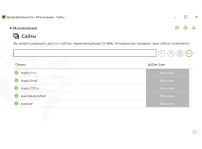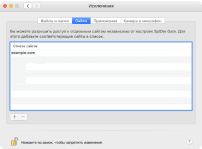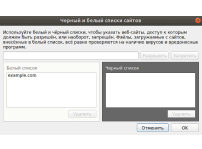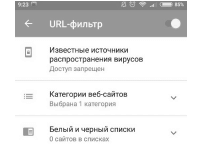Non-recommended sites
Doctor Web's anti-virus programs warn users against visiting various Internet sites because of the possible undesirable consequences of visiting such sites.
Users are entitled to not share our Doctor Web experts’ opinions on the undesirability of visiting certain Internet sites and can add any site to the "Whitelist " in order to not receive informational notifications when visiting such sites, or they can completely disable the anti-virus program’s corresponding functionality that informs users of the undesirability of visiting a particular site.
Doctor Web never blocks access to sites—we don’t have that capability.
We only warn our users against visiting such sites and advise them to be vigilant if, nevertheless, they decide to go ahead and visit them.

What sites do Dr.Web anti-virus products classify as non-recommended?
According to Doctor Web experts, non-recommended sites on the Internet include online casino sites; pyramid scheme sites and sites with signs of pyramid schemes; sites offering questionable ways to get rich quickly and that have enslaving (unprofitable) terms of cooperation; sites that sell goods/services/programs that are actually free.
- sites that, according to data from open sources or from user requests, do not fulfil their obligations, do not render/do not provide (or poorly provide) paid services/a program's goods/other rights, refuse to return money for poor quality services/goods/programs/other rights, and sites for which, according to data from open sources or from user requests, complaints were registered
- sites that do not provide visitors with reliable information about their owners (including sites that offer the sale of goods/services/programs/other rights, but do not contain contact information about the person who carries out business activities and/or is responsible for the site’s activity)
- sites that make it difficult or deprive visitors/consumers of the opportunity to appeal against the actions/inaction of the site owners (including because of their obscurity, or the indication of front persons or "representatives" who are not responsible for site activity)
- sites that make it difficult to return purchased goods/services/programs/other rights, and the exercise by visitors of their consumer rights
- sites that use so-called bulletproof hosting or other ways to avoid responsibility for their activities, and also ways that make it difficult to appeal against their activities
- sites that view themselves as web resources of companies/entrepreneurs, but, at the same time, are registered not to the legal entities or individual entrepreneurs on whose behalf they operate, but to individuals (the “whois” services show data about the owners of such sites as “private person”), which makes it difficult to appeal against their activities online casino sites
- pyramid scheme sites and sites with signs of pyramid schemes
- sites offering questionable ways to get rich quickly and that have enslaving (unprofitable) terms of cooperation
- sites containing offers to buy/sell "miracle" cures, biological supplements, amulets, weight loss products, diets, etc., and sites spreading information about them
- sites containing offers to buy/sell, or sites that spread information about useless, harmful goods and services, fortune telling, horoscopes, information searches by last name, etc.
- sites that sell goods/services/programs that are actually free
- sites that use social engineering methods, have small or invisible fonts, conceal prices and other conditions of a product/service/program before it is purchased, and also use other tricks to dishonestly obtain the contact information of site visitors and sign them up for spam mailings, paid services, etc.
- sites that imitate the site interface of well-known companies, social media
- sites containing various fakes (fake comments, fake reviews, etc.) and sites offering paid review writing services, etc.
- sites that use fake notifications from "anti-virus" programs about allegedly detected threats, and other methods of intimidating visitors
- sites that distribute/aggregate annoying ads, clickbait news posts ("flashy headlines" that do not correspond to the content), advertisers’ sites with no moderation, and also sites containing offers to buy/sell such services, sites of ad networks, etc.
- sites that distribute spam mailing instructions for their implementation, as well as software for these purposes
- sites that use a frame structure and download the content of other sites (in a way that is noticeable or hidden for the user)
- sites that distribute ads for the above-mentioned resources and contain public endorsements of similar sites and activities, as well as instructions for organising/opening them
- other dubious sites
How can I visit a site that Dr.Web anti-virus products consider non-recommended?
To do this, add the site to the whitelist of the HTTP monitor/URL filter.
-
Windows
Instruction

-
Linux
Instruction

-
MacOS
Instruction

-
Android
Instruction

How can I avoid sites on the Dr.Web non-recommended list if my system is not protected by Dr.Web?
If, for some reason, you have not entrusted the security of your computers to Dr.Web, take advantage of the free Dr.Web Link Checker plugins for browsers—use them to scan each page before loading it.
How can I check the security of a site or files if my system is not protected by Dr.Web?
You can check the link (URL) and the files directly on our website.
If I believe that a certain site has gotten into the database by mistake, what should I do?
Report the Dr.Web false positive via the appropriate web form. We will analyse this site again, and one of our employees will definitely reply to you based on the scan results.
What should a site owner do if their site has gotten into the non-recommended URL database?
Write an official email to Doctor Web.
Every request is reviewed by the relevant Doctor Web services to determine whether a warning should be displayed before a user reaches a site.





